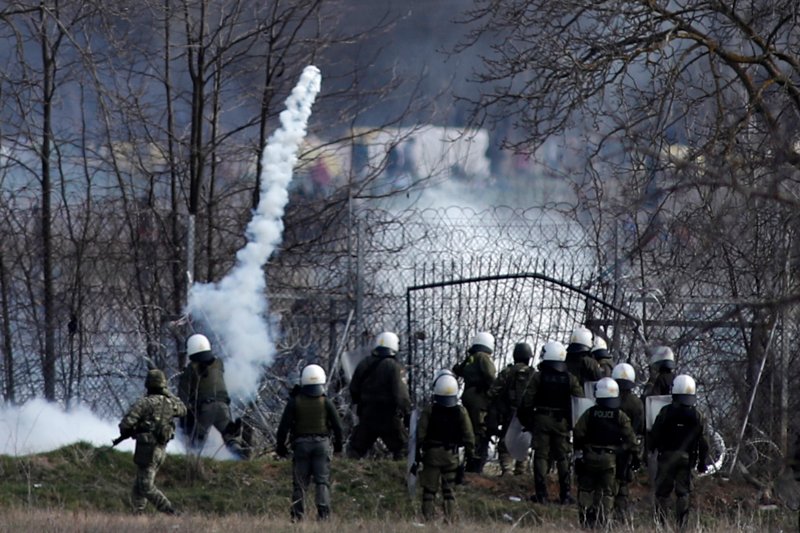While the COVID-19 continues to disrupt the world in the form of travel bans, quarantined cities, and plummeting stock markets, another less recognized crisis is underway in Europe. On February 27th, thirty-three Turkish soldiers were killed in an airstrike in Idlib in north-western Syria.[1] The Russian backed Assad regime justified their attack by stating that the Turkish soldiers were working alongside jihadists.[2] This single deadly incident brought attention to the nearly one million Syrians that have become displaced since the end of last year.[3] In response, Turkey shifted by undermining a 2016 agreement with the EU that has many worried for the future.[4]
On March 18 of 2016, the European Council met with Turkish leaders in order to address the migration crisis and fortify their commitment to finding solutions.[5] The official EU-Turkey statement released included an agreement that Turkey was to halt the flow of all “irregular migrants” from Turkey into Europe in accordance with EU and international law, with a commitment to prevent any land or sea routes from Turkey into Greece.[6] Turkey additionally agreed to improve living conditions both within Syria and along the Syrian border to make it a safer place for displaced peoples.[7] The EU in return promised over 6 billion Euro to create infrastructure, housing, education, and health programs for refugees living temporarily in Turkey.[8] With the hopes of eventual accession into the EU, Turkish leaders were incentivized to adhere to the plan which monitored progress and adherence to the agreement.[9]
But in the past two weeks, Turkey’s President Erdogan, has decided to open their borders to Syrians living within Turkey and has encouraged them to go to Europe.[10] Turkey now refuses to prevent illegal migrants from entering the EU through the Turkish-Greek border, specifically violating the 2016 agreement.[11] In reliance, tens of thousands of Syrians in Turkey have travelled to the Greek border seeking to cross into Europe.[12] However, these hopefuls have been disappointed as Greece fortified its borders with barbed wire, tear gas, and more border patrol agents.[13] Violent encounters continue to increase as thousands attempt to evade border patrol.[14]
Turkey’s actions brought instant condemnation from the EU as leaders like Germany’s Angela Merkel explicitly condemned the violation of the 2016 agreement.[15] Greece, a country also struggling to deal with mass-migration issues blamed Turkey for using the Syrian refugees as political pawns.[16] Although the EU criticized Turkey’s decision to violate the deal, leaders also acknowledge the difficult situation that Turkey has been put into geopolitically.[17] President Erdogan met with Brussels in order to negotiate a way forward.[18] The meeting showed recommitment to cooperation with the EU encouraging Turkey to return to its 2016 promises, yet this was short lived.[19] Just days later, President Erdogan announced that Turkey’s borders would remain open until the EU complied with its demands including more aid.[20]
With over 3.5 million Syrian refugees living in overwhelmed Turkey, fears of a second wave of European migration crisis are beginning to permeate the EU.[21] Although the Turkish-Syrian border remains closed, events like the airstrike in Idlib threaten an even greater influx of migrants into Turkey.[22] The EU is attempting to hold strong to prior agreements, stating that blackmail and forced negotiations at the expense of refugees are unacceptable.[23] Yet the EU desires to remain cooperative and is likely to discuss the conditions for granting more aid to Turkey.[24]
What appears on the surface to be a standoff between Turkey and Greece is in fact much more complicated. The complexity of the refugee situation is unsettling for all parties and is straining relations between nations throughout the region. With no signs of the Syrian conflict deescalating, this appears to be an international crisis that will not go away readily. The future is uncertain, yet it is likely that Turkey and the EU will be negotiating soon to address the way forward.
- Syria War: Alarm after 33 Turkish Soldiers Killed in Attack in Idlib, BBC (February 28, 2020) www.bbc.com/news/world-middle-east-51667717. ↑
- Id. ↑
- Id. ↑
- Germany’s Merkel: Turkey’s Handling of Migrant and Refugee Crisis ‘Unacceptable’, Deutsche Welle (March 9, 2020) www.dw.com/en/germanys-merkel-turkeys-handling-of-migrant-and-refugee-crisis-unacceptable/a-52688912. [hereinafter “Deutsche Welle”] ↑
- European Commission Press Release, EU-Turkey statement (March 18, 2016). ↑
- Id. ↑
- Id. ↑
- Id. ↑
- Id. ↑
- Tear Gas Hits the Fan during Clashes on Greek-Turkish Border, ABC News Network (March 12, 2020, 1:57) abcnews.go.com/International/wireStory/tear-gas-hits-fan-clashes-greek-turkish-border-69567426. [hereinafter “Greek-Turkish Border Clashes”] ↑
- Id. ↑
- Charlotte McDonald-Gibson, E.U. Is Unprepared for Refugees from Turkey-Greece Border, Time (March 10, 2020) time.com/5800116/eu-refugees-turkey-greece-border/. ↑
- Greek-Turkish Border Clashes, supra note 10. ↑
- Id. ↑
- Deutsche Welle, supra note 4. ↑
- Id. ↑
- Id. ↑
- Michalopoulos, Sarantis, Brussels Warns Erdogan Not to Hinder Efforts to Solve EU-Turkey Crisis, Euractiv, (March 12, 2020) www.euractiv.com/section/enlargement/news/brussels-warns-erdogan-not-to-hinder-efforts-to-solve-eu-turkey-crisis/. ↑
- Id. ↑
- Id. ↑
- Syria Regional Refugee Response, UNHCR (March 5, 2020) https://data2.unhcr.org/en/situations/syria/location/113. ↑
- Deutsche Welle, supra note 4. ↑
- Id. ↑
- Id. ↑


